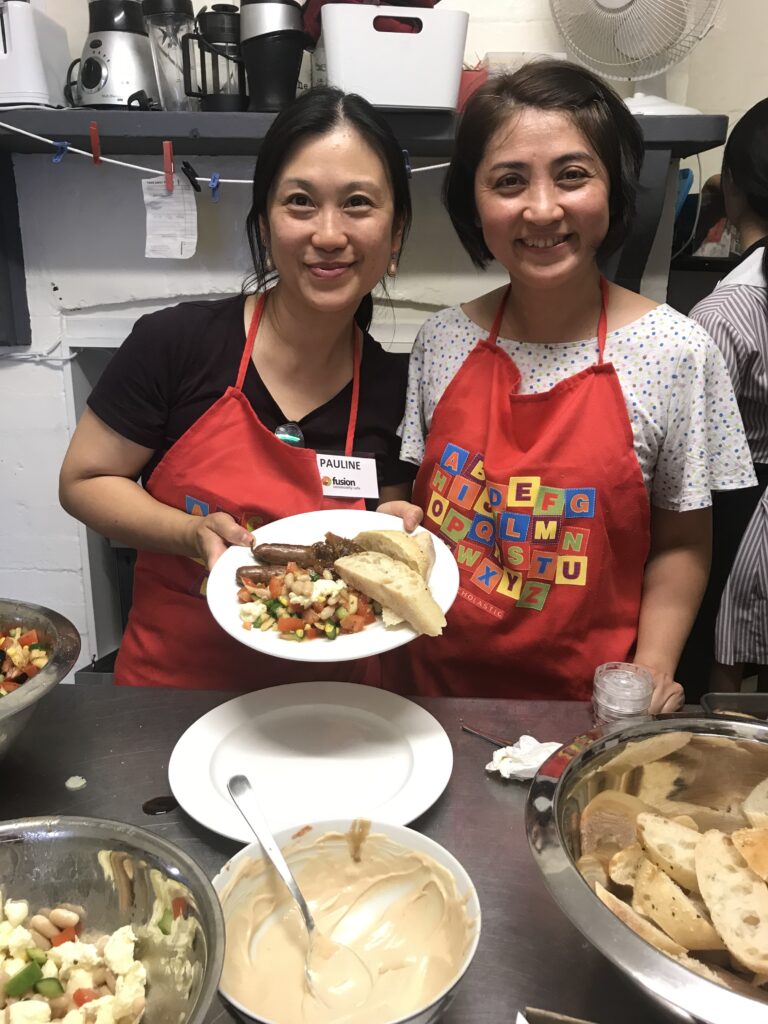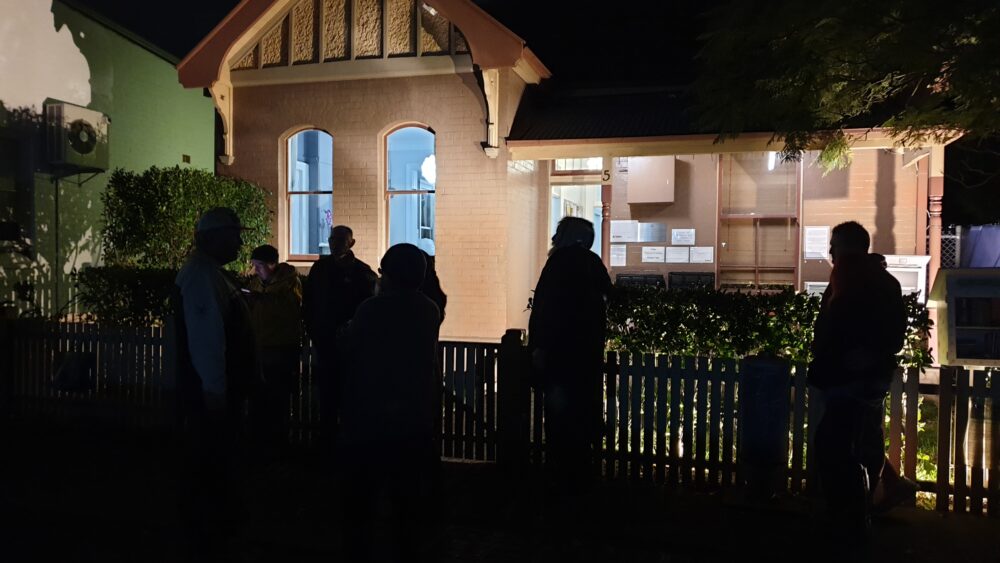It takes a community to feed a community
Especially during COVID-19
Every weeknight, Leisa Liddelow says goodbye to her own family and heads out to feed those in need on the streets of Hornsby in north-west Sydney.
Liddelow is operational coordinator of The Dish food van, which serves up a three-course meal to people in the community every Tuesday and Friday night.
“On an average night before COVID, we would have around 15 people. Now, we are averaging 25 plus.” – Leisa Liddelow
An initiative of St John’s Uniting Church in the nearby suburb of Wahroonga, The Dish has now been operating for 15 years.
During that time, it’s never been busier than in the past three months since the onset of coronavirus. The number of people using the service has almost doubled.
“On an average night before COVID, we would have around 15 people. Now, we are averaging 25 plus,” says Liddelow.
“We are also consistently putting frozen meals in a freezer where people can come and take what they want. I think for some people, there’s a bit of a stigma attached to [coming to the van], so we’ve found the self-serve thing has been quite helpful.”
Liddelow – who also works as a wellbeing worker at St Ives High School – says there’s “a great variety of people” who are using their service, not just people who are homeless.
“There are also aged pensioners, people with mental health challenges and single parents. For a lot of these people, it’s the only decent meal they will get that day.”
Since COVID, she’s noticed an increase in the number of older people coming to The Dish, who have perhaps lost their jobs and are not eligible for JobKeeper payments – although Liddelow clarifies that they don’t ask questions about why people use their service, they are simply glad they do.
“We’ve seen a massive increase in takers [for free groceries].” – Myf Webster
The Dish has had to change the way it operates due to social distancing. Previously, plated meals were served from the van at Hornsby Park, where customers could sit at tables and chat together. But for the past few months, the van has offered a takeaway service in the carpark of the local branch of Fusion, a Christian-based youth and community development organisation.
The move makes a lot of sense anyway, as for the past few years Fusion has also been providing a community dinner service at its premises – on Mondays and Thursdays, alternate nights to The Dish. Liddelow volunteers for Fusion on her nights off from her 10-hour paid job with The Dish, and many customers go along to both services.
“I see these clients continuously through the week, so I feel like I’ve got quite a good relationship with them. That’s been a really helpful thing,” says Liddelow.
“People know that they come to me now. I’ve had someone ask me for a reference. One man who’d had an operation was a bit worried about coming out to get his meals, so we sorted out home delivery for him.
“I guess those sorts of things only come with trust through being able to see them on a regular basis.”
Fusion has put its primary focus – youth ministry – on hold in order to cater to the growing community needs due to COVID. It’s begun serving community dinners on a third night each week – Wednesday – as Waitara Gospel Chapel, which usually serves the community on this night, is unable to at the moment due to legislative requirements around coronavirus.

At Fusion in Hornsby, Pauline and Boon prepare ‘pot-luck’ meals using donated ingredients
Both Fusion and The Dish have also seen greater need for the free groceries and clothing they provide. Fusion offers free fruit, veges and bread through Second Bite, an organisation that rescues surplus food from retailers and redistributes it through local charities.
“We’ve seen a massive increase in takers,” says Myf Webster, team leader for Fusion Sydney North.
This is due in part to Fusion distributing 10,000 flyers in local suburbs at the onset of coronavirus, advertising their free food hampers and suggesting people nominate someone who might benefit from a hamper.
Webster notes that international students have been among those receiving hampers, as they may not be eligible for government benefits to help ease job losses.
She expects there could be an even greater need for their food services in the months ahead, saying “we may well see repercussions once JobKeeper stops.” This is currently due to happen on September 27, although there have been suggestions that this date could change.
Fortunately for both Fusion and The Dish, a swathe of volunteers are on hand to help them keep up with demand. These volunteers come from local schools and churches of many different denominations – including Uniting, Adventist, Anglican, Baptist and Catholic – as well as the Soroptimists and Sydney Adventist Hospital.
For Liddelow (a member of St Stephens Normanhurst Anglican Church) – as for many of these volunteers – her Christian faith is the driving force behind her commitment to helping others.
“I love to be able to help. I love to be able to give back. As a Christian, I try to keep in mind that we are called to love those who society might think are unlovable.
“That’s what motivates me. If I can just make someone’s day by going, ‘Hey, how you going?’, that’s a good thing. Some are not coping with the whole COVID thing. So I’ll often say to them, ‘Would you like me to pray about that for you? Can I pray now?’”
“It’s not just about the food. It’s like a bit of a safety net for people.” – Leisa Liddelow
Liddelow notes that her involvement in these services (through the support of her husband) also serves as a good witness to her 19-year-old son, who still lives at home, and her daughter at university in Newcastle, as well as to many others.
“It’s important for [my children] to know that while they are sitting at home with a meal every night of the week, there are people out there who don’t have that. And this is why we do what we do. That’s a really great witness,” she says.
Like many of those who attend the community dinners, Liddelow is missing the social contact that used to play a key part in these nights, as people sat around sharing a meal and conversation.
“It’s not just about the food. It’s like a bit of a safety net for people. They know they can come, see the people they normally see, and have a meal and a chat.”
While Liddelow says some in this community are “desperate to go back to the old way”, Fusion and The Dish are currently considering how and when to recommence seated dinners while maintaining social distancing.
One of the good things to come out of the coronavirus period is there is now greater connection between the many volunteers and services working in the Hornsby community to support those in need.
“There’s so many different agencies working locally, that I think if you combine your resources and what you’re doing, it’s a really good thing,” says Liddelow.
She adds: “It’s great to have lots of different churches involved because I think that also shows that inclusiveness as well.”
After all, in their mission to serve their community, promoting inclusiveness is what services like The Dish and Fusion are all about.
Email This Story
Why not send this to a friend?


